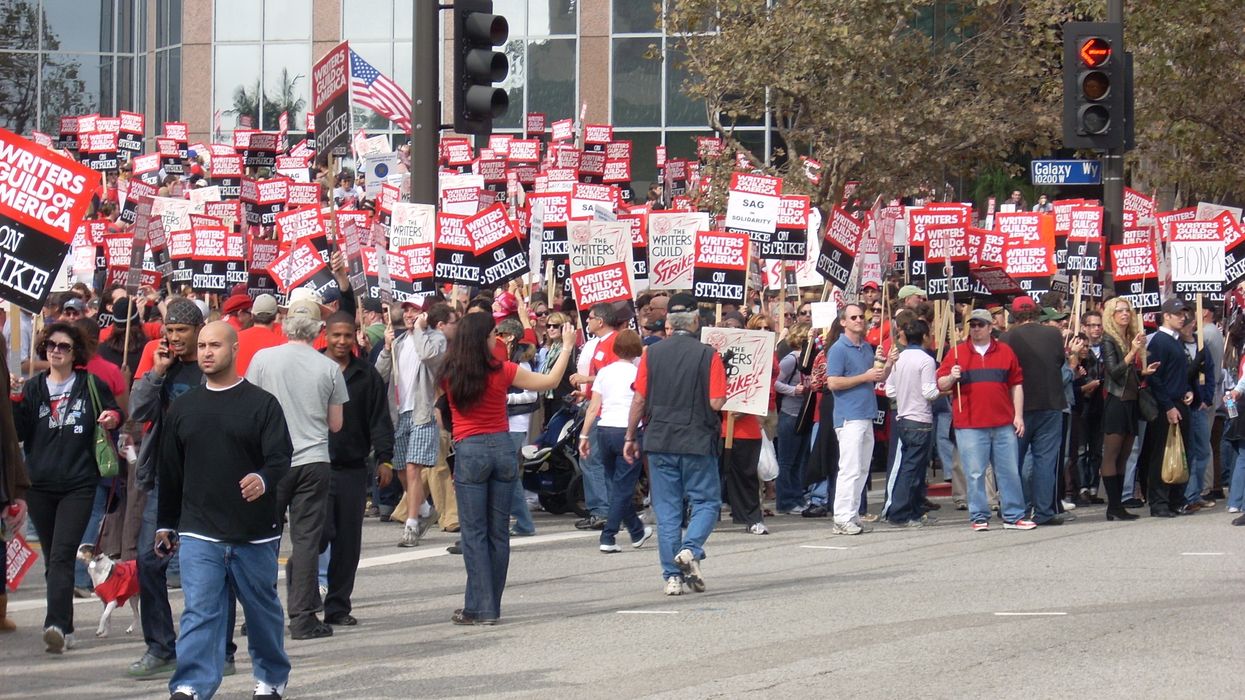WGA Video Rips Agent Arguments to Shreds
The WGA members will vote today on whether or not they will collectively leave their Agents on April 7th if no new deal is reached.

On March 27th, the members of the WGA will vote on whether or not to hold the ATA to the code of conduct presented to them in regards to packaging. The online vote will now begin on March 27 at 9 p.m. PT and end March 31 at 10 a.m. If the resolution passes, and no agreement is met with the ATA, then agents will forfeit their ability to represent writers who are in the WGA.
The WGA sent out a letter on the 26th of March from the guild’s negotiating committee as the WGA and agents were about the hold their seventh negotiating session...“While we continue to work toward a negotiated agreement with the Association of Talent Agents prior to the expiration date of the agency agreement we must simultaneously continue with contingency planning....We have a plan...We know we cannot replace agents. There will be difficult moments. But our goal is to get through staffing season and whatever period of time it takes to make a fair deal with the agencies.”
Along with the letter came a video summarizing the WGA's platform and shredding the ATA's arguments.
In addition to the video, almost 800 showrunners and screenwriters announced that they had backed the WGA’s battle against talent agencies taking packaging fees. You can read David Simon's personal letter here. The signers endorsed the WGA’s efforts to reform decades-old industry practices and doubled down with this statement:
WGA Statement of Support
We are Voting YES
We are voting YES to support Guild implementation of an Agency Code of Conduct after the current AMBA expires on April 6th, if there is no negotiated settlement.
We agree a new agency agreement should:
Confront practices that constitute a conflict of interest: agency packaging fees and agencies functioning as producers.
Require the agencies to work with the Guild to protect writers’ interests by providing writer contracts, invoices and other information.
In accordance with Working Rule 23, we will only be represented as writers by agencies franchised by the Guild.
We commit to support our fellow Guild members following termination of the current agreement.
Read the full statement here!
What happens if no deal is reached?
If no deal is reached with the ATA, then it means Agents aren't interested in representing writers anymore. the WGA has granted fiduciary duties to Managers and Lawyers, as well as created a database on their website where so that companies can search and hire writers for their projects.
From the WGA:
THE PLAN, SUMMARIZED
If your agency doesn’t sign the Code of Conduct and is no longer able to represent members, you will not have to sever the relationship alone. As writers we can do it collectively. If you’d like to seek new representation, the Guild will be keeping an up-to-date list of all franchised agents.
Fundamentally, agents provide three things: access, negotiation, and advocacy.
The Guild is launching two online tools to provide access, both for writers looking for work, and for producers and executives looking for writers. For negotiation assistance, members who don’t have other representation and need to make an overscale deal will need to find an attorney and can contact the Guild for assistance.
The Guild is supporting the efforts of members who are stepping up to advocate for each other. Many writers, including showrunners, have offered to provide references for writers they have worked with in the past, and writers are organized through the Guild’s captains and committee structures. In addition, writers are expanding existing informal networks to support each other in this time.
In success, these tools and networks will continue to support the entire membership long after the agency struggle is resolved.
You can read the WGA's full plan on their website.
Will writers still have agents?
The only way a writer in the WGA will have an agent is if that agent agrees to and works for a company that agrees to the code of conduct proposed by the WGA.
The biggest questions people have are about employment. From the WGA:
IF YOU ARE CURRENTLY EMPLOYED:
Writers who are employed will continue to work as usual.
If your former agency was already commissioning this job, you must continue to pay them (just as you would if you changed agencies).
IF YOU ARE SEEKING EMPLOYMENT:
If you already have a manager and/or a lawyer:
If you have a manager and/or a lawyer, it should be business as usual. Managers and lawyers will be able to work to negotiate any contracts for staffing, development, or sale of materials. Discuss with your representatives how you want to handle meetings and submissions. Make sure everyone’s roles are clear and lines of communication are established.
What's next? Explore the Writer v. Agency Debate!
A 40-year agreement is about to come to an end. And the future of writer representation hangs in the balance. The WGA and ATA are going 12 rounds over the Artists' Manager Basic Agreement, a document signed into existence in 1976 that outlines the basic tenements of how Agents and Managers should represent writers.
Last year, the WGA decided that based on data and testimony collected that agreement needed a serious revamp. Hollywood does not look at all like it did in 1976, and the rise of agencies, packaging fees, and digital has created murky waters. The Association of Talent Agents, or ATA, was approached by the WGA to start a new negotiation based on these grievances.
Read the article to get the full scoop!











